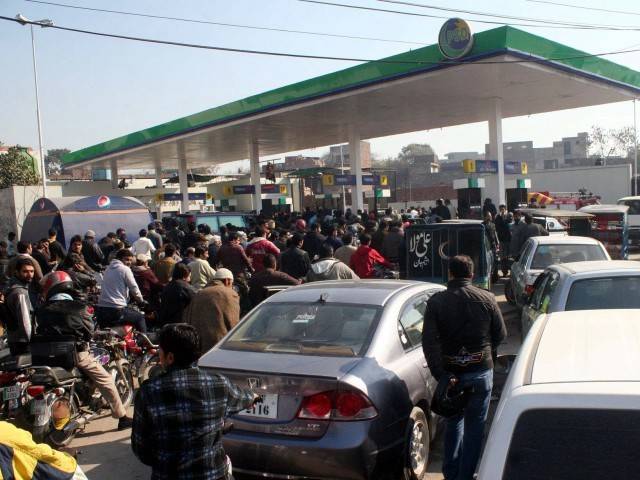It is my time to laugh,” he said as he wiped his tears, blew his nose into his cuff, and smiled. He is not alone. Charlie Chokas is among thousands of Lahoris who had to face relentless public humiliation when oil prices began to fall drastically, because they had wasted their money and bought hybrid cars. But his luck changed when Lahore experienced the worst gasoline shortage in its history. “It is my time to laugh at people.”
Out on the streets, we witnessed scenes never seen before in the city’s modern history: the people of Lahore – widely known to be lazy, fat dimwits who only like to eat and sleep – were seen walking on their own two feet. “It was unbelievable – so many people coming out of their homes but not going to restaurants,” Charlie said. “The long lines at fuel stations went on for several miles,” he said, “almost as long as the lines I see every day outside the breakfast shop in my inner city neighborhood.”
The government is in a state of panic. “We were about to bring the reasons behind the petrol shortage to light, but the light has been switched off because of a shortage of electricity,” a federal minister told reporters.
Analysts disagree on the actual cause of the shortage, but the most plausible explanation came from a senior bureaucrat: a sharp increase in dry cleaning activity in January. “People wear warm clothes in winter, which needs weekly dry cleaning,” he elaborated during a press conference. “Most dry cleaners use petroleum-based solvents, usually gasoline, thus causing a sharp increase in the demand.” He said the use of warm clothes had risen after a shortage of natural gas rendered home heating equipment inefficient.
Not everyone agrees. An oil industry veteran believes the cause of the crisis is linked with the increased number of weddings in December and January – often referred to as the wedding season in Lahore. “Women shop for more clothes in these two months than they do during the rest of the year,” he said. “We all know how they want to be dropped off right in front of the shop they want to go into, and need their husband or driver to keep the engine on and stay right there until they come out, thus significantly increasing the consumption of fuel.”
A government official believes the real reason behind the shortage of petrol was hoarding. “In panic, people are buying more gasoline than they require, thus causing a shortage,” he said on the condition of anonymity. Asked why they were hoarding petrol in panic, he said it was because of a shortage of gasoline.
Regardless of the actual cause of the crisis, there are many who do not want it to end. Those who benefit from this crisis include more than just hoarders, opposition politicians and Charlie Chokas. As the government began stopgap measures to manage the shortage, representatives of the All Pakistan Association of Tuck Shops and Restaurants Situated at Fuel Stations met key politicians of the ruling party to thank them. According to a press release, sales at such shops have increased to a point where they are making profits despite all the shoplifting.
In rural Punjab, resilient Pakistanis were quick to innovate. Experts were astonished to see a simultaneous emergence of vehicles that run on biofuel. Witnesses say the one-horse-power machine is pulled by one horse. “The animal takes care of the conversion of green fodder into energy, which it then uses to pull the cart,” explained an engineer who specializes in alternate energy. “The exact mechanism is hard to replicate outside of the horse,” he said. “At a time when donkeys are increasingly being killed for meat that is then sold as beef, the horses of this nation have a huge responsibility on their shoulders,” a housewife opined. “I have faith in their ability to help us during this time of crisis.”
But those who had put their trust in cars that ran purely on gasoline are now giving up. “I believe in Karma,” says Charlie Chokas. “Every time they saw the long lines outside fuel stations of cars that run on CNG, they judged them.”
Friday, April 19, 2024
Dry cleaners behind petrol shortage?

The author has a degree in Poetics of Prophetic Discourse and works as a Senior Paradigm Officer. He can be contacted at harris@nyu.edu. Follow him on Twitter
SC suspends ECP’s re-polling order in PP-51
April 19, 2024
Court approves plea bargain of Parvez Elahi’s co-accused
April 19, 2024
Zardari creates another parliamentary record
April 19, 2024
KP politicians, civil society laud President’s address
April 19, 2024
A Tense Neighbourhood
April 19, 2024
Dubai Underwater
April 19, 2024
X Debate Continues
April 19, 2024
Hepatitis Challenge
April 18, 2024
IMF Predictions
April 18, 2024
Kite tragedy
April 19, 2024
Discipline dilemma
April 19, 2024
Urgent plea
April 19, 2024
Justice denied
April 18, 2024
AI dilemmas unveiled
April 18, 2024
ePaper - Nawaiwaqt
Advertisement
Nawaiwaqt Group | Copyright © 2024





